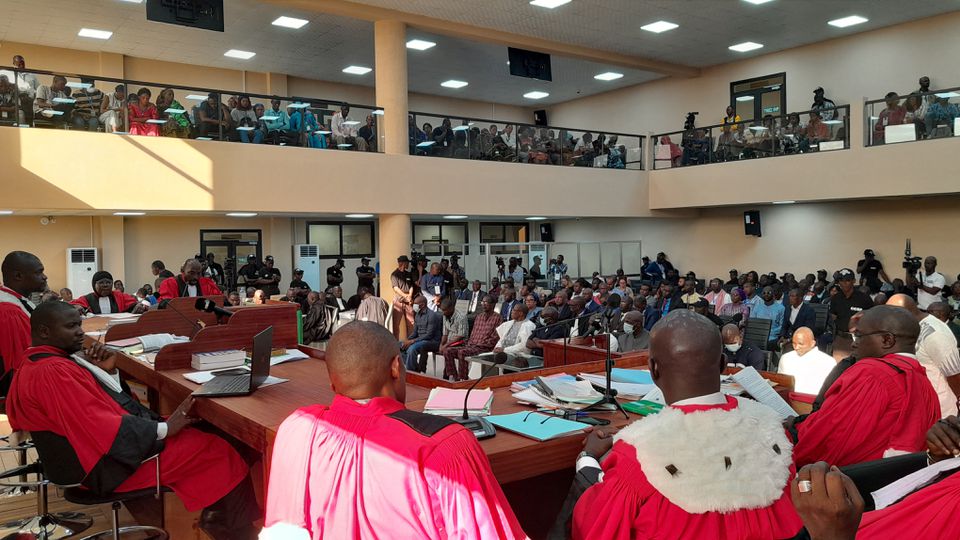
Exactly 13 years after the stadium massacre in Conakry, the trial of the main suspects finally begins on September 28, 2022.
On 28 September 2009, thousands of supporters defied a ban on demonstrations by the National Council for Democracy and Development (Conseil National pour la Démocratie et le Développement, CNDD), the junta led by Captain Moussa Dadis Camara. The protesters crammed into the stadium, singing, dancing and praying. Hostile slogans against the junta were being chanted when suddenly the military stormed the stadium and opened fire on the demonstrators.
A total of 157 people were killed, hundreds of women were raped and dozens went missing, according to human rights organisations.
A couple of years after the massacre, 13 army officers were indicted, but not detained. On September 28, 2022, eight of them were detained. One is dead, two others have been charged in absentia.
Shortly after taking power on September 5, 2021, Colonel Mamady Doumbouya, the president of the National Council of Rally for Development (Conseil National de Rassemblement pour le Développement, CNRD), promised to organise the trial of suspects in the September 28, 2009 massacre.
The Head of the Junta appointed Charles Alphonse Wright, then-Attorney General of the Court of Appeal, as Minister of Justice and Human Rights. He entrusted him with a specific mission: organising the trial latest by September 28, 2022. Colonel Doumbuouya set up a steering committee for the trial and aided in the renovation and furnishing of the courthouse where the trial was to take place.
Judges and clerks in charge of the trial were trained. Financial and logistical resources for the trial were provided by Colonel Mamadi Doumbouya. Everything has been set for the opening of the trial.
The latest act towards actualising this trial was the detention yesterday, Tuesday, September 27, 2022, of Captain Moussa Dadis Camara and five other defendants at the Central House of Conakry. The defendants are Colonel Moussa Tiegboro Camara, General Abdoul Chérif, Colonels Mohamed Kalonso, Blaise Gomou and Claude Pivi.
These new developments in the massacre case are a source of joy for the families of the victims and the victims themselves.
Nevertheless, while supervising this historic trial of former military leaders suspected of one of the most horrible, human rights violations in Guinea, the current military junta is building its own record of abuses and atrocities against civilians.
In his first speech after the coup of September 5, 2021, Colonel Doumbouya promised that no Guinean’s blood would be shed anymore, but the National Council of the Rally for Development (CNRD) has changed its tune. The junta now has to its dubious credit a dozen opposition supporters shot dead during recent political demonstrations that the opposition and civil society organised to get the junta to shorten the transition period. International organisations are also demanding that the military release detainees. The approval rating of Colonel Doumbouya and his junta is rapidly dropping.
The current junta in Guinea seems to be trigger-happy. The killings under its aegis have plunged Guineans back into the anguish that left them on the day of the coup against Alpha Condé. In keeping with Guinea’s history of political violence, the junta has embarked on a path of violent repression of demonstrations and popular gatherings, harassment and arrest of critical and dissident voices.
From July 18 to 30, 2022, at least four people died in a deadly crackdown on demonstrations by Guinean security forces in Conakry, the capital of Guinea. The police used tear gas and live ammunition to keep order. There were several gunshot wounds and more than 80 civilians arrested.
The new ‘liberators’ who have become the ‘executioners’ are hardly distinguishable from their forebears who shed tears and blood in Guinea’s weak democracy. For instance, the regime of former president Alpha Conde shone in the dark colours of a series of blatant violations against the principles of democracy and human rights. To reaffirm its commitment to stay in power and forever silence even the slightest hint of opposition, the ousted government, among other measures, pushed through parliament on July 6, 2019, a controversial piece of legislation that empowers the gendarmes to shoot on sight during public order and counter-terrorism operations. The legislation also exempts the security forces from prosecution.
Between June 2019 and March 2020, about 50 people were killed, more than 100 arrested and hundreds injured in crackdowns by the security forces.
It is the hope of the Media Foundation for West Africa (MFWA) that this trial will result in redress for the wrongs committed during the unfortunate events of September 28, 2009, to put an end to impunity for the attacks on protesters in Guinea. While we express our heartfelt condolences to the families of the victims and our support for the ongoing trial, we strongly urge the current junta to ensure justice for the victims of the abuses committed under its regime. We also call on the junta to engage in an inclusive dialogue for national reconciliation.
